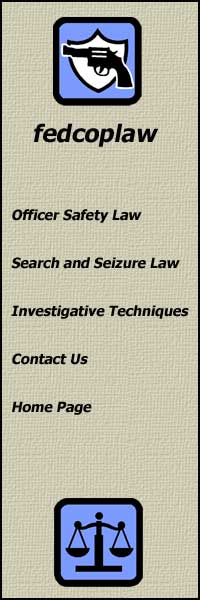 |
|
INVESTIGATIVE TECHNIQUES LAW
Copyright 2001 - 2018 Edward S. Armstrong, Jr.
Copyright 2001 - 2018 Edward S. Armstrong, Jr.
All law enforcement officers must confer with their training officers, legal advisors and prosecutors regarding the following legal issues. State law can be more restrictive (pro-defendant) than Federal law. Federal circuit courts of appeal often disagree with other Federal circuit courts on issues not yet decided by the United States Supreme Court. Also, lower courts (State and Federal) sometime disagree on what a Supreme Court decision means. The following statements are not to be taken as legal advice.
5. BINOCULAR, TELESCOPE
U.S. v. Whaley, 779 F.2d 585 (11th Cir. 1986)
U.S. v. Taborda, 635 F.2d 131 (2nd Cir. 1980). See #13 for FLIR device.
6. POLE CAMERA
U.S. v. Houston, 813 F.3d 282 (6th Cir. 2016)
U.S. v. Jackson, 213 F.3d 1269 (10th 2000)
U.S. v. Cuevas-Sanchez, 821 F.2d 248 (5th Cir 1987)
U.S. v. Garcia-Gonzales, District Court MA, 14-10296-LTS, (9/1/2015)
7. RECORDING CRIMINAL ACTIVITY & STATEMENTS – Police may record what they see, can see, and hear lawfully. Police may record what an informer sees and hears lawfully with the informer’s prior consent.
U.S. v. McIver, 186 F.3d 1119 (9th Cir.1999) (motion activated still and video cameras hidden in National Forest).
U.S. v Langonia, 177 F.3d 1179 (10th Cir. 1999)(tape recording of undercover conversations in English & Spanish admissible, even though undercover CI did not speak Spanish).
U.S. v. Jackson, 213 F.3d 1269 (10th Cir. 2000)(video and audio of CI’s vehicle with consent).
See #6, above Pole Camera
8. SNEAK AND PEEK SEARCH WARRANT – Police may obtain a Search Warrant for observation and photographs only, U.S. v. Pangburn, 983 F.2d 449 (2nd Cir. 1993)(storage locker).
9. SILENT VIDEO SEARCH WARRANT – Police may obtain a Search Warrant to install a silent video camera in a suspect’s private premises, U.S. v. Koyomejian, 970 F.2d 536 (9th Cir 1992)(en banc).
10. MAIL COVER – Since there is no REP on the outside of U.S. Mail, Police may request the Postal Inspector to permit a Mail Cover where the Postal Service records information to locate fugitives, protect national security or solve criminal violations, Title 39 Code of Federal Regulation Section 233.2, U.S. v. Choate, 576 F.2d 165 (9th Cir 1978).
11. TRASH SEARCH – Police may examine the contents of a suspect’s trash placed at a curb on pickup day without a SW or Consent, California v. Greenwood, 108 S.Ct. 1625 (1988).
12. TRACKING DEVICES
U.S. v. Jones, U.S. Supreme Court (2012)
Police are required to have Consent, a Search Warrant or Exigent Circumstances to (1) place a GPS (global positioning device) on a suspect's vehicle and to (2) monitor the suspect's travel patterns.
Consent to Search GPS - U.S. v. Plasencia, 11th Circuit, 16-16946 (2018)
State #1 GPS SW, followed suspect into State #2; State 2 notified, State 2 obtained premises SW U.S. v. Castetter, 865 F.3d 977 (7th Cir. 2017)
U.S. v. Knotts, 103 S.Ct. 1081(1983)
U.S. v. Karo, 104 S.Ct.3296 (1984)
13. FORWARD LOOKING INFRARED (FLIR) – Police must have Consent, a Search Warrant or Exigent Circumstances before using a FLIR device toward a residence, Kyllo v. U.S., 121 S. Ct. 2038 (2001). See #5 & #6.
14. OVERFLIGHT – Police may use an airplane and helicopter for surveillance and fly at low altitudes if operated lawfully under Federal Aviation Administration regulations and in airspace where flights are routine, California v. Ciarolo, 106 S.Ct. 1809 (1986), Florida v. Riley, 109 S.Ct. 693 (1989). Police may use sophisticated surveillance equipment to photograph a thing or activity in public where it does not reveal intimate details, Dow Chemical Company v. U.S., 106 S.Ct. 1819 (1986). See # 5, 6 & 13.